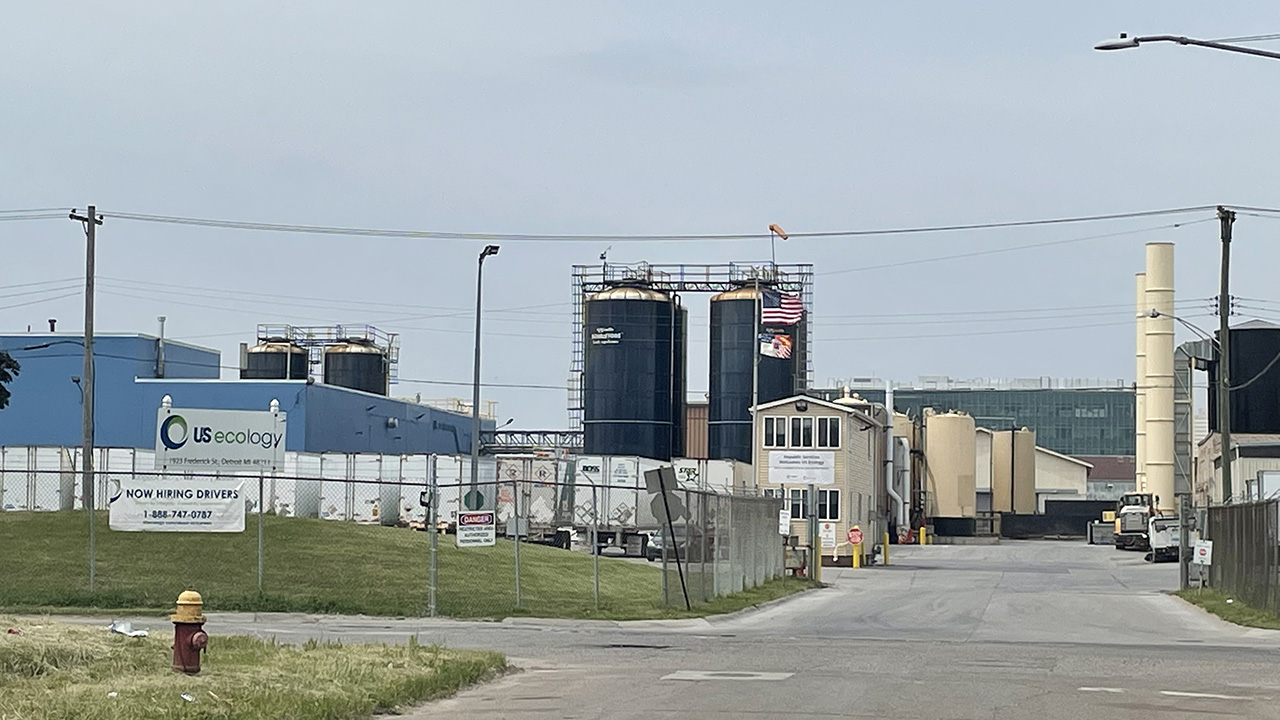Residents demand more accountability for hazardous waste facility in Detroit after odor violations
The plant, acquired by Republic Services in May but formerly operated by U.S. Ecology, has been issued 35 violations by EGLE since 2014.

A photo of the US Ecology south plant in Detroit, Mich.
Advocates are seeking a host community agreement with the City of Detroit on a hazardous waste plant in the Poletown East neighborhood.
The Michigan Department of Environment, Great Lakes, and Energy (EGLE) says since 2014 it has issued 35 violations to the facility, which was recently acquired by Republic Services from U.S. Ecology.
“One of the issues at this facility is a continual problem with dust that is stirred up by materials they lay down on the ground,” says Rev. Sharon Buttry, a volunteer facilitator with the Detroit Hamtramck Coalition for Advancing Healthy Environments and a resident of Hamtramck. “It’s supposed to mitigate some of the waste issues on their property — but it ends up stirring up a lot of dust into the air, which may lead to some of these odors.”
Buttry says the smell has impacted the life of residents who live near the facility at 1923 Frederick St.
“The residents have complained that they haven’t been able to go out on their bikes, have picnics, really even be able to enjoy outdoors so it becomes a quality of life issue,” says Buttry.
The coalition has not been able to get a satisfactory response to mitigation of the odors, Buttry says, so they are seeking a host community agreement in an effort to make the facility operators be better neighbors.
“This would allow us to have, in a legal format, regular meetings with the facility,” says Buttry.
It’s also a way, she says, to require that the company participate in the life of the community in some way, “whether that’s supporting events or supporting educational projects around the issue of environmental justice.”
“The residents have complained that they haven’t been able to go out on their bikes, have picnics, really even be able to enjoy outdoors so it becomes a quality of life issue.” —Rev. Sharon Buttry, Detroit Hamtramck Coalition for Advancing Healthy Environments
The Detroit Hamtramck Coalition for Advancing Healthy Environments began in opposition to the expansion of a different facility — U.S. Ecology North. The coalition sought a host community agreement with that plant when the facility was seeking a permit for expansion of hazardous waste storage.
“We knew that meant more truck traffic,” Buttry says. “It meant more potential hazards related to spills. And we just didn’t feel like it belonged in our neighborhood, because this is already a neighborhood, and residents, who are overburdened by pollution.”
The coalition was able to ban fracking waste from coming into that facility, Buttry says, as well as reroute trucks and establish a relationship with the plant. “We have quarterly meetings with the plant manager and leaders of that facility. And that’s what we’re looking for now, is to have regular meetings with U.S. Ecology South and deal with the specific complaints of that facility.”
Buttry says a lot of attention has been paid to the air quality of Southwest Detroit, but she says the east side of the city where these plants are is also overburdened.
“If you look at environmental justice mapping, we’re very much affected,” Buttry says. “If you overlay demographics, and the cumulative health risks that are documented, it’s a high-risk area for pollution and health impacts that are adverse for the population.”
Buttry says a permit renewal is coming up this year for the facility so the coalition has mobilized to build support for the petition in support of the host community agreement, including a recent canvassing of the neighborhood.
“We are making comments on the permit renewal, but we felt like it was an opportune time to highlight some of the issues that have not been addressed by EGLE or the plant. So we’re using the permit process window as a time to say, let’s get this in order so that residents can have some real response related to their concerns.”
Buttry says laws relating to how industry affects the environment need to be improved and better enforced.
“We know industry is not going away,” she says. “But we need it to be much more responsive to human health and safety needs.”
Trusted, accurate, up-to-date.
WDET strives to make our journalism accessible to everyone. As a public media institution, we maintain our journalistic integrity through independent support from readers like you. If you value WDET as your source of news, music and conversation, please make a gift today.

